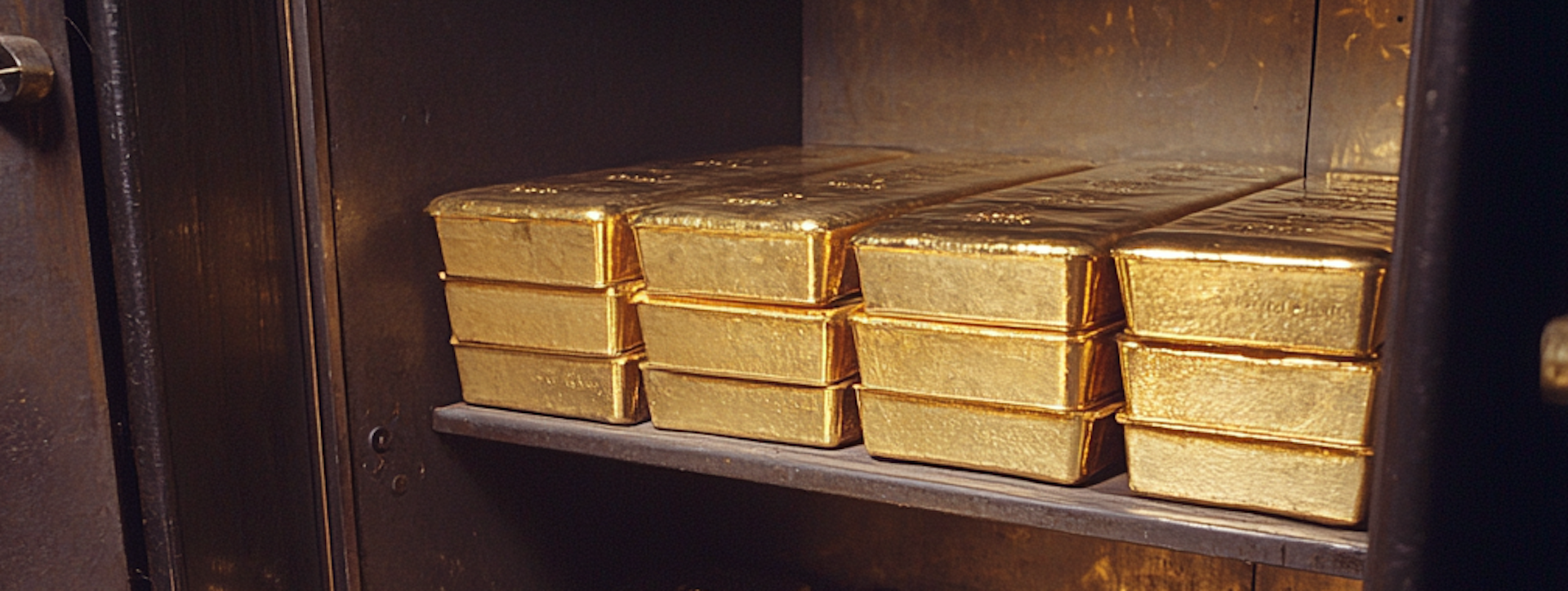Investing in gold and other precious metals, such as silver and platinum, is an excellent way to diversify your retirement account while hedging against market volatility. Gold is a physical asset, unlike stocks and mutual funds, so you’ll need somewhere to store it.
In a standard gold IRA, your gold must be stored with a custodian. However, some investors use a workaround known as a home storage gold IRA. If you’re considering this type of IRA, it’s essential to understand the potential implications before deciding if it’s the right vehicle for you.

What Is a Home Storage Gold IRA?
A home storage gold IRA is a self-directed IRA strategy in which gold investors store their gold on their property, such as in a safe, vault, or similarly secure location. This contrasts with how gold is stored in a standard gold IRA, in which a custodian or trustee stores gold in an IRS-approved depository.
Though a home storage gold IRA may provide increased control of your assets, there are significant IRS risks should you choose this path. In addition to potential legal issues, you may also face security issues, as gold held in your home may be more vulnerable to theft.
Does the IRS Allow Home Storage Gold IRAs?
No, the IRS does not allow home storage gold IRAs for compliant self-directed IRA investing. Gold, as well as other precious metals, can only be held in a self-directed IRA (SDIRA), and you must work with an IRS-approved custodian to maintain an SDIRA. If you add precious metals to your SDIRA, the custodian must hold the physical precious metals in a depository.
If you keep gold owned by your IRA in your home, you are in violation of IRS laws. At a minimum, you’ll have tax penalties. However, failure to rectify the issue can also result in the disqualification of your IRA.
Rules for Storing Gold and Commodities in an IRA
To remain compliant with IRS requirements, investors must adhere to strict storage regulations when holding precious metals in an IRA:
- Use an IRS-approved custodian. The metals must be stored with an IRS-approved IRA custodian or depository.
- Precious metals must meet IRS purity standards. The IRS requires that gold, platinum and palladium held in an IRA be at least 99.5% pure. Silver must be 99.9% pure.
- Proper reporting and documentation. Any IRA investment must follow IRS reporting guidelines, including proper tracking of transactions.
- Cannot be in your possession. You cannot maintain possession of the asset shield in your IRA. This is similar to the rules that forbid real estate investors from utilizing the property held in their IRA.
Alternatives to a Home Storage Gold IRA
There are a few alternatives to a home storage gold IRA:
- Work with an IRS-approved custodian/depository. If you want to hold gold in your IRA, the best thing you can do is work with an approved custodian who specializes in gold and commodity investments.
- Indirectly invest in gold. You can indirectly hold gold and other precious metals by investing in mutual funds and exchange-traded funds (ETFs) centered on the previous metal or commodity of your choice.
- Invest in gold outside of your IRA. If you really want to invest in gold and prefer to maintain custody of it, you may want to consider investing in it outside of your IRA, saving your IRA for other assets.
Why Gold in a Self-Directed IRA Is Still Beneficial
Just because you can’t keep gold in your home doesn’t mean you should forego the benefits of a gold IRA.
- Hedge against inflation and volatility. Gold is not linked to market performance and therefore can help you weather market ups and downs that often affect other assets, like stocks and mutual funds.
- Portfolio diversification. Adding physical precious metals reduces reliance on traditional stocks and bonds.
- Tax Advantages. Contributions and earnings grow tax-free while in the account. If you have a Traditional IRA, your contributions are made with pre-tax dollars, and you’ll pay taxes on qualified withdrawals in retirement. If you have a Roth IRA, contributions are made with after-tax dollars, and withdrawals are made tax-free.
While the IRS may forbid gold home storage IRAs, there are still plenty of alternatives for holding physical gold in a retirement account and earning compound interest.
FAQs
Should I trust a home storage gold IRA?
No, it’s not wise to trust a home storage gold IRA. The IRS has specific rules that forbid IRA investors from keeping gold and other precious metals in their possession. Instead, precious metals must be held in an approved depository. Failure to comply with IRS rules will result in penalties and potentially the disqualification of your IRA.
Is a gold IRA different from a home storage gold IRA?
Yes. A gold IRA meets IRS requirements by holding gold in an approved depository via a custodian. A home storage gold IRA is an investment strategy that does not comply with IRS rules and can result in substantial penalties.
What are the tax advantages of a gold IRA?
A gold IRA offers tax-deferred or tax-free growth, depending on whether it is a Traditional or Roth IRA. Traditional IRAs are funded with pre-tax dollars, which means you can purchase gold with the pre-tax contributions. Earnings and contributions grow tax-free while in the account. Withdrawals from the account are taxed. Roth IRAs are funded with after-tax dollars, but qualified withdrawals are tax-free.



